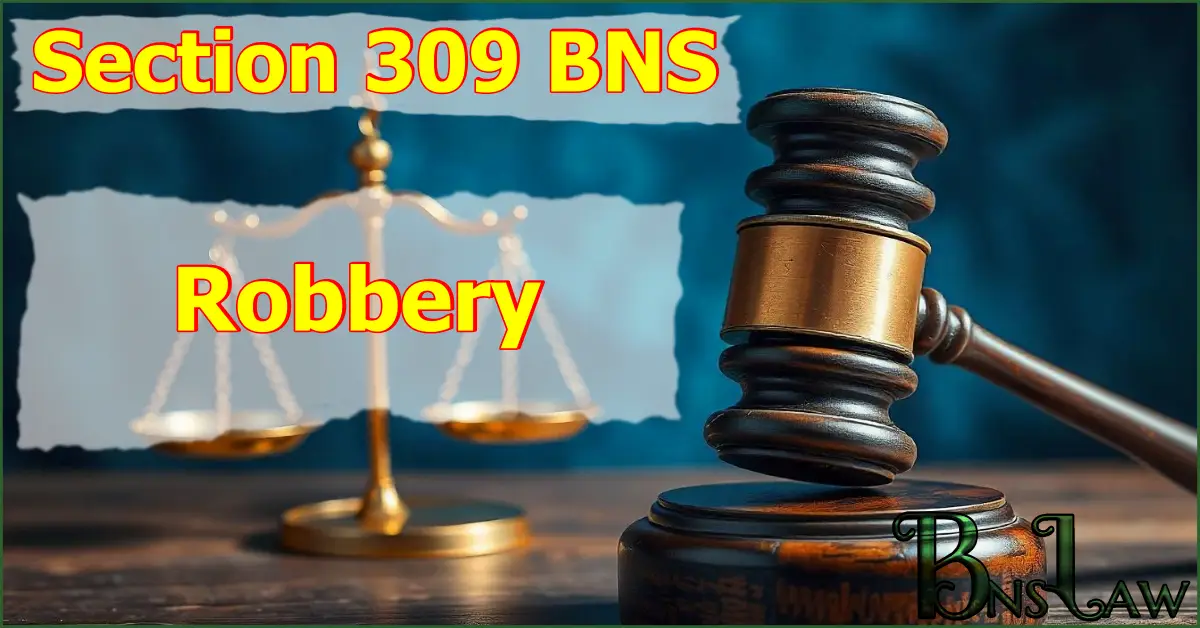Section 309 BNS | BNS 309 | Robbery Section
309(1) BNS
In all robbery, there is either theft or extortion.
309(2) BNS
Theft is robbery if, in order to the committing of the theft, or in committing the theft, or in carrying away or attempting to carry away property obtained by the theft, the offender, for that end voluntarily causes or attempts to cause to any person death or hurt or wrongful restraint, or fear of instant death or of instant hurt, or of instant wrongful restraint.
309(3) BNS
Extortion is robbery if the offender, at the time of committing the extortion, is in the presence of the person put in fear, and commits the extortion by putting that person in fear of instant death, of instant hurt, or of instant wrongful restraint to that person or to some other person, and, by so putting in fear, induces the person so put in fear then and there to deliver up the thing extorted.
Explanation— The offender is said to be present if he is sufficiently near to put the other person in fear of instant death, of instant hurt, or of instant wrongful restraint.
Illustrations
(a) A holds Z down, and fraudulently takes Z’s money and jewels from Z’s clothes, without Z’s consent. Here A has committed theft, and, in order to the committing of that theft, has voluntarily caused wrongful restraint to Z. A has therefore committed robbery.
(b) A meets Z on the high road, shows a pistol, and demands Z’s purse. Z, in consequence, surrenders his purse. Here A has extorted the purse from Z by putting him in fear of instant hurt, and being at the time of committing the extortion in his presence. A has therefore committed robbery.
(c) A meets Z and Z’s child on the high road. A takes the child, and threatens to fling it down a precipice, unless Z delivers his purse. Z, in consequence, delivers his purse. Here A has extorted the purse from Z, by causing Z to be in fear of instant hurt to the child who is there present. A has therefore committed robbery on Z.
(d) A obtains property from Z by saying—“Your child is in the hands of my gang, and will be put to death unless you send us ten thousand rupees”. This is extortion, and punishable as such; but it is not robbery, unless Z is put in fear of the instant death of his child.
309(4) BNS
Whoever commits robbery shall be punished with rigorous imprisonment for a term which may extend to ten years, and shall also be liable to fine; and, if the robbery be committed on the highway between sunset and sunrise, the imprisonment may be extended to fourteen years.
309(5) BNS
Whoever attempts to commit robbery shall be punished with rigorous imprisonment for a term which may extend to seven years, and shall also be liable to fine.
309(6) BNS
If any person, in committing or in attempting to commit robbery, voluntarily causes hurt, such person, and any other person jointly concerned in committing or attempting to commit such robbery, shall be punished with imprisonment for life, or with rigorous imprisonment for a term which may extend to ten years, and shall also be liable to fine.
READ OTHER SECTIONS OF CHAPTER XVII — OF OFFENCES AGAINST PROPERTY
FAQs of BNS Section 309
-
309 BNS punishment and fine
Punishment and fine under Section 309 of the BNS—
309(4): Rigorous imprisonment for 10 years and fine.
If robbery committed on highway between sunset and sunrise: Rigorous imprisonment for 14 years.
309(5): Rigorous imprisonment for 7 years and fine.
309(6): Imprisonment for life, or rigorous imprisonment for 10 years and fine. -
309 BNS cognizable or not
The offence under Section 309(4), 309(5) and 309(6) of the BNS is cognizable.
-
309 BNS bailable or not
The offence under Section 309(4), 309(5) and 309(6) of the BNS is non-bailable.
-
309 BNS trial court
Offence specified in Section 309(4), 309(5) and 309(6) of the BNS is triable by the Magistrate of the first class.
Important Points
- Cognizable Offences: These are offences where a police officer can arrest a person without a warrant.
- Non-Cognizable Offences: These are offences where a police officer cannot arrest a person without a warrant.
- Bailable Offences: These are offences where the accused can get bail from the police station itself. All bailable offences are listed in the First Schedule of the Bharatiya Nagarik Suraksha Sanhita (BNSS).
- Non-Bailable Offences: Offences in which bail is not granted directly from the police station but after hearing the case in the court, the judge decides when bail will be granted. All non-bailable offences are listed in the first schedule of the Bharatiya Nagarik Suraksha Sanhita (BNSS).
- In the above FAQ, “trial court” means the court that has jurisdiction to try the offence.
- In the above FAQ, the expression “Magistrate of the first class” and “Any Magistrate” does not include Executive Magistrates.
Read other Sections of the BNS
Reference Link: New Criminal Laws (BNS), Ministry of Home Affairs







